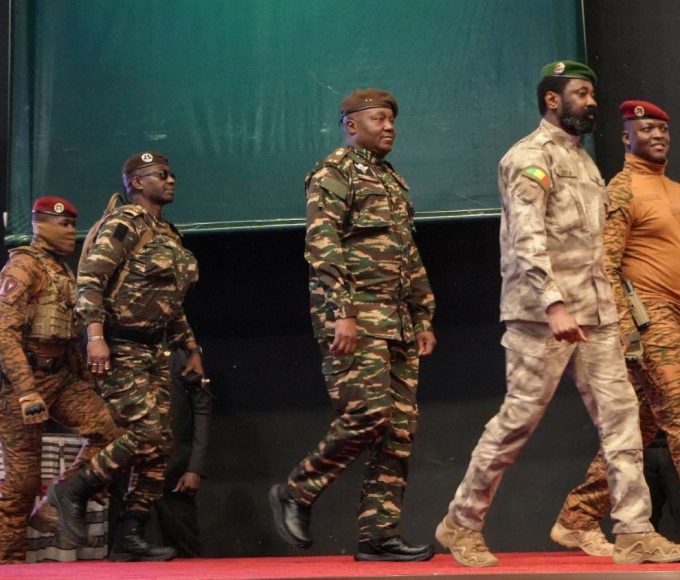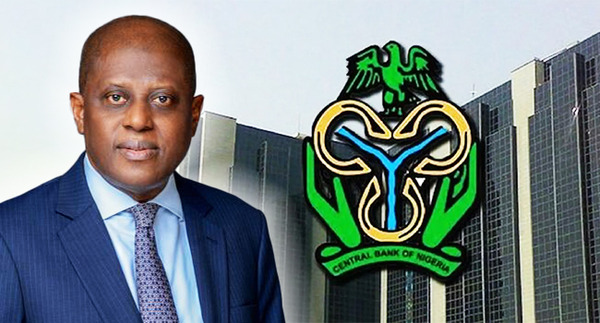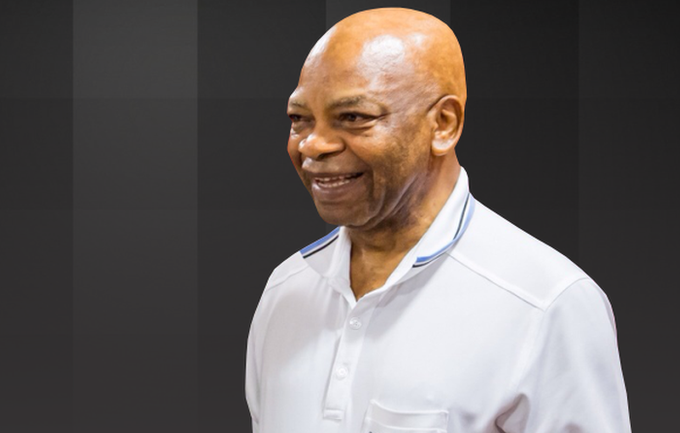
#RutoMustGo Explainer: Why and How Kenyans Challenged Their ‘Tax Collector’ President
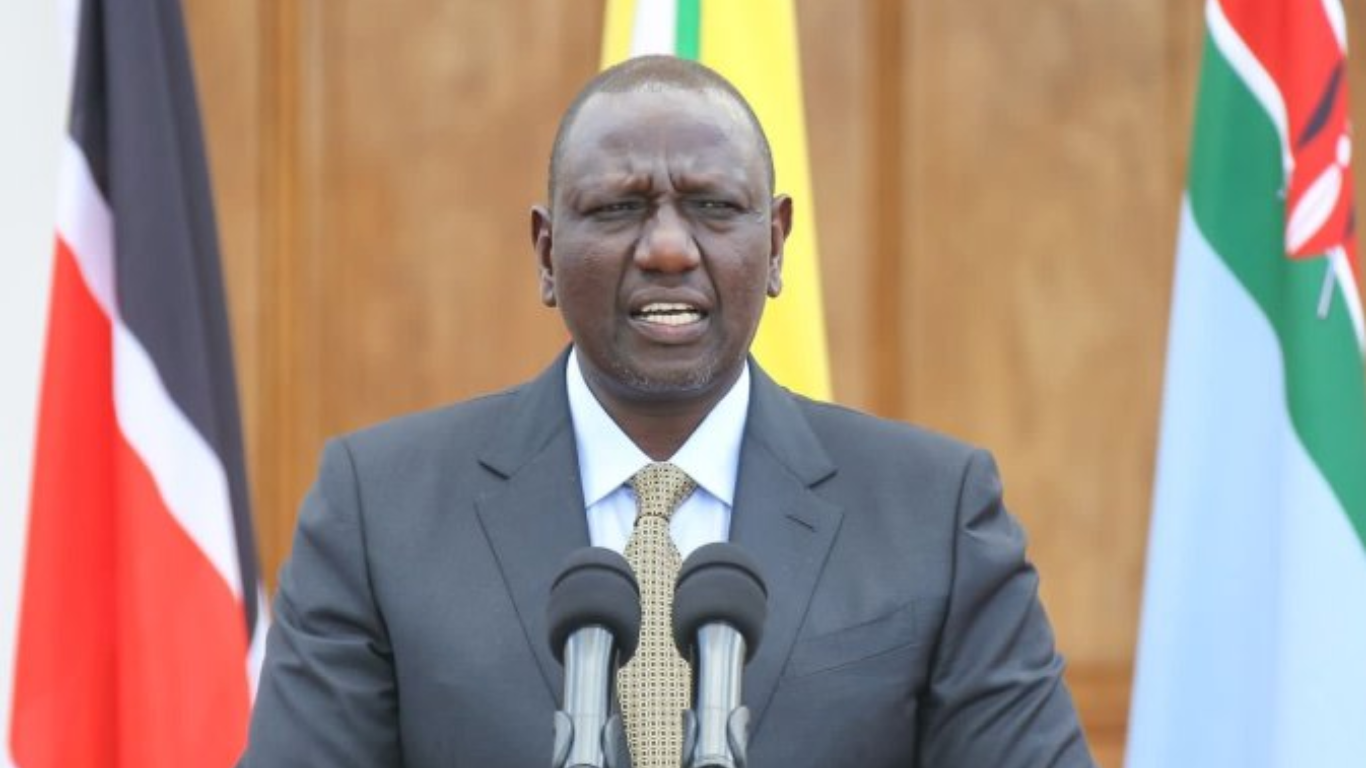
This time last month, Kenya’s President William Ruto was in the United States for a state visit. He beamed at the clicking cameras at a joint Press Conference with President Joe Biden. Both men fraternised and talked about strengthening democracy and economic ties between their countries.
Just a month later, citizens of Kenya are calling for Ruto’s resignation. They have held a week-long protest against his administration and specifically a Finance Bill he championed. The protests which started online rapidly mushroomed into a nationwide demonstration and the occupation of key government buildings including the parliament. Ruto’s response was to deploy armed policemen and special law enforcement units to quell the protest but that only fed the fire. The crackdown degenerated into full-scale violence as security officials fired teargas and live ammunition at protesters killing at least 23 people, according to the Kenya National Commission on Human Rights.
The people’s rage witnessed over the week is an expression of bottled-up resentment against Ruto’s administration, but what triggered such rage?
Kenyans have been grappling with exacerbated economic hardships due to the government’s policies. Two years into Ruto’s administration, he has increased taxes on fuel, salaries, and housing, among a host of new taxes. The citizens bore the burden with regard to their President’s sermon about making concessions to bring the country out of its current economic depression. However, his frequent hikes in taxes have failed to improve the quality of life for the majority of Kenyans.
While Kenyans grumbled about poor social amenities and a rising cost of living, Ruto argued that they needed to pay more taxes to afford better public services and reduce the country’s debt burden. With a public debt of 11.1 trillion Kenyan shillings (Ksh), approximately 82.1 billion U.S. dollars as of December 2023, Kenya is compelled by the International Monetary Fund to reduce its debt-to-GDP ratio from its current 68% to about 50-55%. And Ruto decided that the poor masses had to be burdened with more taxes. “We must be able to enhance our taxes, (although) it is going to be difficult,” he said earlier this year. But how much more tax burden would Kenyans shoulder?
The Tax Collector Moves To Tax Bread, Sanitary Pads, Others
The final straw was the new taxes introduced by Ruto’s administration in the Finance Bill 2024. The government said it aimed to raise $2.7 billion in additional taxes and thereby introduce new levies on basic commodities including a 16% sales tax on bread, a 25% duty on cooking oil, and an “eco levy” on local manufactured goods such sanitary pads and diapers. The bill also proposed a new motor vehicle circulation tax – pegged at 2.5 per cent of the value of a car to be paid annually. In addition to the new taxes, an increment of existing taxes on financial transactions was also on the table.
Protests started on social media and soon erupted into a nationwide demonstration. The protesters, mostly young people said the poor masses would make no more concessions, instead asked Ruto and other public servants to cut their lavish spending. For instance, the office of the Deputy President spent 10.2 million shillings ($70,000) on furniture and $50,000 on curtains last year, according to a report released by the country’s auditor general. Ruto himself planned to renovate one of his offices with more than 700 million shillings.
Despite killing and abductions by state-sponsored policemen and soldiers, the protesters remained unfazed in their demand for the withdrawal of the bill. They took over the parliament building on Tuesday, forcing lawmakers to flee. They also declined invitations to dialogue by the federal government.
Ruto Brands Protesters “Criminals”
In his initial reaction through a live broadcast, the President described the protesters as “organised criminals” and their demonstrations “treasonous” as vowed to restore peace by deploying more soldiers to quell the protests. “This day’s events represent a crucial moment in how we address threats to our peace. We will take measures to ensure that such a situation does not happen again.
“I have directed all organs of our national security to deploy measures to thwart any attempts by dangerous criminals to undermine the security and stability of our country. As the people of Kenya go to bed tonight, I give you my assurance that the safety of your families and properties remains my utmost priority,” he said.
Still, the young determined protesters refused to back down.
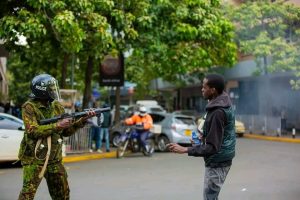
International Organisations Call for Peace
The Chairperson of the African Union Commission, HE. Moussa Faki Mahamat, in a statement on Tuesday night, asked the government and protesters to “refrain from further violence”. He called for a peaceful dialogue “to address the contentious issues that led to the protests in the supreme interest of Kenya.”
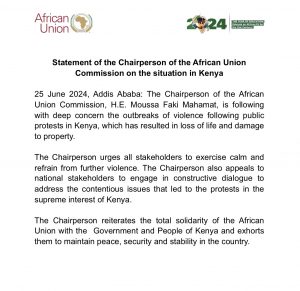
A joint statement by the foreign missions of Germany, Ireland, Netherlands, United States, Belgium, and Romania, Canada and the United Kindom expressed concern of the violence and “call for restraint on all sides”. Like the statement of the African Union, it was released on Tuesday night, hours after protesters had been killed.
Ruto Concedes, Withdraws Finance Bill
With the security’s failure to contain the protests, and pressures from home and abroad, President Ruto, on Wednesday declined assent and withdrew the controversial Finance Bill.
“Listening keenly to the people of Kenya who have said loudly that they want nothing to do with this finance bill 2024, I concede, and therefore I will not sign this Finance Bill, 2024. and it shall subsequently be withdrawn, I run a government but I also lead people. And the people have spoken,” Ruto conceded in another televised broadcast.
He promised to engage Kenyans, especially young people on their areas of concern in the bill. “I also propose that within the next 14 days, a multi-sectoral, multi-stakeholder engagement be held with a view to charting the way forward.”
While this may have dowsed tension, commentators say he should have withdrawn the bill before the escalation of protests and loss of lives.
CNN reporter Larry Madowo wrote on X, “President William Ruto could have withdrawn the Finance Bill a few days ago and saved lives. But he was obstinate, and I watched police shoot protesters dead for no reason at all.”
“His Time Is Up”
Kenyans however, are not taking the withdrawal of the bill as a win. They are demanding his resignation and also threatening to recall MPs who initially supported the bill.
Speaking to West Africa Weekly on the implications of the protests on the public service and the political future of President Ruto, William Sakawa, Senior Correspondent at the Nairobi-based Pan-African news platform African Stream said “His (Ruto’s) time is up.”
He noted that Ruto’s addresses to Kenyans show that he cared more about the international community, particularly the IMF than he cared for Kenyan citizens. He explained that public opinion never favoured the bill, yet Ruto and the majority of MPs showed arrogance by insisting on passing the bill.
“Kenyans are seeing this, and they are saying his time is up. In terms of legitimacy, he has none. His political future at this point is only guaranteed by how much violence he is willing to inflict in order to keep power.”
Sakawa noted that an organic protest of such magnitude had not been witnessed in Kenya before and that it sent a strong message to political leaders in the country. “Its implication on public service is that members of the parliament now have to watch their steps.”
About The Author
Related Articles
Burkina Faso President Ibrahim Traoré Reviews 2025 Achievements, Sets Ambitious Agenda for 2026
Burkina Faso’s President, Ibrahim Traoré, has described 2025 as a year of...
ByWest Africa WeeklyJanuary 28, 2026Mali Says Reports of New Three-State Sahel Currency Are False but Talks Continue on Economic Integration
Mali’s government has rejected claims that it and its neighbours, Burkina Faso...
ByWest Africa WeeklyJanuary 28, 2026CBN Upgrades Opay, Moniepoint, Kuda and Others to National Licences
The Central Bank of Nigeria has upgraded the operating licences of several...
ByWest Africa WeeklyJanuary 28, 2026Arthur Eze Loses Senegal Offshore Oil Block as Government Reclaims Licence
Senegal has revoked an offshore oil exploration licence held by a company...
ByWest Africa WeeklyJanuary 28, 2026









